Now I am become Death, the destroyer of worlds, Robert Oppenheimer (Cillian Murphy) reads in Sanskrit from the Hindu text of the Bhagavad-Gita to his lover Jean Tatlock (Florence Pugh), both naked, sitting face to face in a pause of love. Christopher Nolan has filmed the first sex scene of his career and he has made the most of it, because it is almost a pregnant instant that fossilises everything he shows and insinuates throughout his film. Firstly, the intellectual background of a humanist scientist whose millionaire and progressive parents enrolled him in the Ethical Culture Society School; on the other hand, one of the most intimate traits of his personality, his supposed passion for women and, finally, the awareness of being a decisive architect of a war device whose consequences he naively believed he could control, and a guilt whose uncertain atonement would accompany him until his early death.
In Oppenheimer, Nolan has adapted Kai Bird and Martin J. Sherwin’s American Prometheus, a definitive biography of the scientist, winner of the Pulitzer Prize in 2006. The myth opens his film with another quote, describing the terrible fate of the one who dared to steal fire and give it to men, as Prometheus ended up chained and nailed to the Caucasus by order of Zeus, where an eagle devoured his liver every day. Over the course of 180 minutes, we witness the torment and ecstasy of one of the men who marked the 20th century and contributed to a new world order, and to stage it, the director of Inception sets his discourse on the basis of confrontation. The non-linear narrative pivots around two axes: Fission and fusion, which, in a Salieri-Mozart (Strauss-Oppenheimer) duel, confront two men whose struggle is unequal, because one of them is unaware of what he is facing and cannot identify his nemesis.
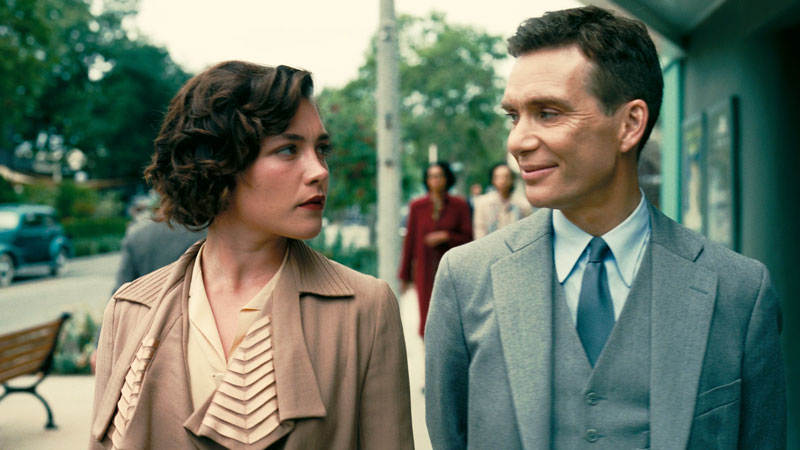
Fission and fusion alternate in a chronology that doses flashbacks between two non-judicial investigations; the first, in 1954, supported by McCarthyism and instigated by Lewis Strauss, starts with the pretext of an alleged renewal of the scientist’s credentials to remain on the US Atomic Energy Commission (AEC), of which the philanthropist and politician is chairman. The denial of this accreditation based on Oppenheimer’s alleged communist affiliation would be revoked in 2022, by the Secretary of Energy, claiming that a “flawed process” had been followed and that his loyalty was beyond doubt, but the enmity of Strauss, promoter of atomic energy and chairman of the commission, and the scientific competition with the advocates of the hydrogen bomb, turned Oppenheimer into a martyr whom history rehabilitated.
Throughout the sessions, filmed in black and white, like an insert highlighting the spokes in the wheels of his career, Oppenheimer appears timid, shy, his wife Kitty (Emily Blunt) reproaches him for his passivity and his probably learned helplessness, he submits to humiliation in the same way that he submitted to bullying at school in his childhood, without complaining. The personality of the “father” of the atomic bomb appears tortured, his thinness, his eyes (the scientist’s were even bigger than the actor’s) make up a sacrificed hero/anti-hero, which the director exalts in the purest respect for the keys of the Hollywood biopic, despite its lights and shadows.
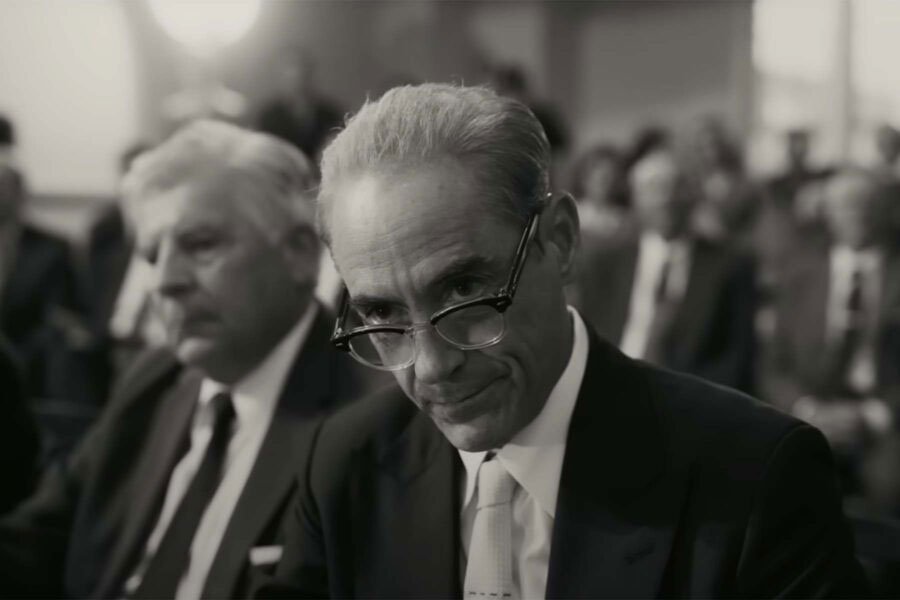
The defining aspects of Nolan’s Oppenheimer are a chiaroscuro that shows him to be psychologically unstable in his youth – by means of the anecdote of the poisoned apple, which reminds us of Turing, another martyr of intolerance -; despite his shyness and his acknowledged lack of social skills, he manages to manage among the military and scientists and successfully lead his team; on the other hand, his unexpected naivety makes him vulnerable. Regarding his political profile, his solidarity with communism and the Spanish republic is a personal commitment, but not a militant one, reinforcing that reticent individualism opposed to gregariousness.
The unlawful questioning to which he is subjected is aimed at his annihilation, humiliation and discrediting, a harassment whose climax would be topped off by Truman after his interview in the Oval Office, when he called him a crybaby (I don’t want to see that son-of-a-bitch in this office ever again) for having confessed that his hands were stained with blood. Oppenheimer’s attempts to influence the conditions under which the bombing was to take place proved futile, nobody listened to him, in a conversation that seemed to be straight out of Catch 22 (Joseph Heller), when the American generals refused to evacuate an Italian town that was about to be attacked by the Allies, just to free them.
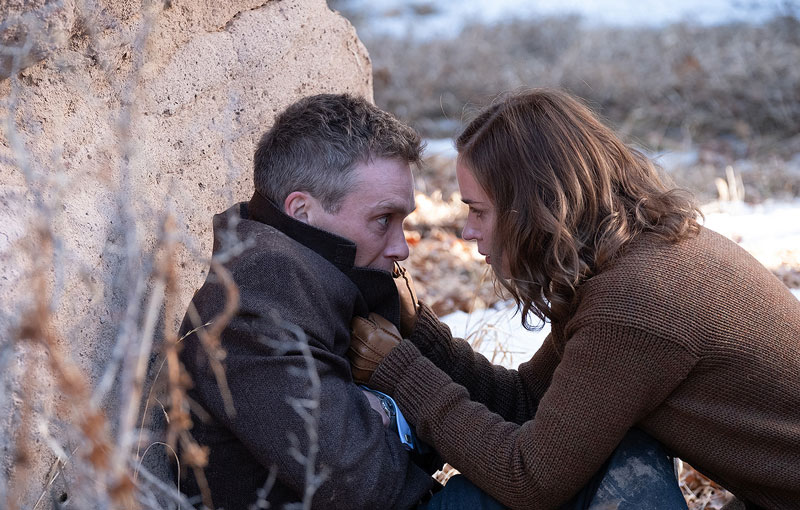
The scene showing Oppenheimer’s reaction to the Trinity test does not, of course, have the expressive device of his wide eyes, which he covers with goggles, as he stands in a hut watching the explosion through a small window. However, the impression conveyed to the viewer is no less shocking than that of Kurt Gerstein, the SS officer who in Amen (Costa-Gavras, 2002) takes a distracted glance at the peephole in the back of a truck, to discover to his horror the effects of Zyklon B, the distribution of which he knew, but the use of which he was unaware. A moment can turn us into someone else, and a gesture can reveal it.
Christopher Nolan is the Einstein of contemporary cinema, neither space nor time have any secrets for him, but now he also demonstrates that he can move with the same brilliance on all scales and, moreover, combine them. The intimacy of the portrait and the grandeur of his story seem to be woven into the same frame, with an admirable balance.
And now we come to the fusion, where Nolan has his final trick in store. The second investigation he shows us takes place in the Senate where, also in dramatic black and white, Lewis Strauss undergoes the supposedly routine hearings leading to his appointment as Secretary of Commerce in 1958. Everything takes on another dimension, the gazes, the silences, take on their real significance and what we have seen acquires a meaning. What was, what seemed to us and intentions are revealed and the emotional and political thriller explodes almost fifteen years after the atomic bomb.
Aunque Oppenheimer no sea La mejor y más importante película desde lo que llevamos de siglo, como apreció Paul Schrader —fascinado por un personaje tan afín a las personalidades complejas e inadaptadas que habitan su cine—, es una epopeya espectacular y un retrato conmovedor, fotografiado por Hoyte van Hoytema —nominado al Oscar por Dunkerke (2017)— con un tratamiento del color hermoso e impactante, editado por Jennifer Lame, aunque algunos primeros planos resultaran expresivamente redundantes, así como la música de Ludwig Göransson, cuya presencia abruma en demasiados momentos.
Although Oppenheimer may not be The best, most important film of this century, as Paul Schrader appreciated —fascinated by a character so akin to the complex and maladjusted personalities that inhabit his films—, it is a spectacular epic and a moving portrait, photographed by Hoyte van Hoytema —Oscar-nominated for Dunkirk (2017)— with beautiful, striking colour treatment, edited by Jennifer Lame, even if some close-ups were expressively redundant, as was Ludwig Göransson‘s music, whose presence overwhelms at too many moments.
The film, which is likely to win an Oscar for Robert Downey Jr. as the impressive Lewis Strauss, features a cast in a state of grace, led by a dedicated and measured Cillian Murphy, supported by Emily Blunt, Florence Pugh, Benny Safdie (Edward Teller), Matt Damon (Leslie Groves), Josh Harnett, Matthew Modine, Casey Affleck, Gustaf Skarsgard, Kenneth Branagh, Rami Malek and a cameo appearance by Gary Oldman as Harry S. Truman.
Oppenheimer unfolds the epic of the story, descends in low-flying flight into the intimacy of his character, without shying away from the moral question or positioning, and certainly elevates Nolan’s filmography without breaking the rules.

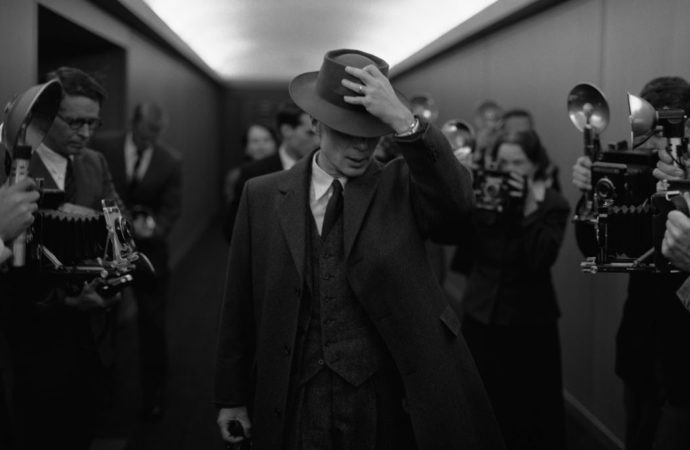





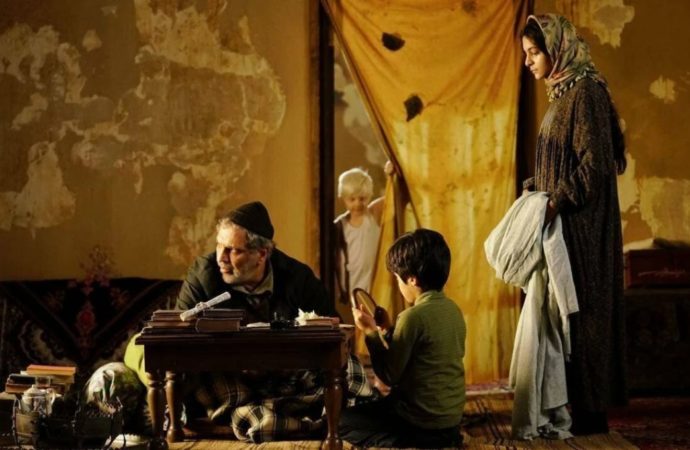
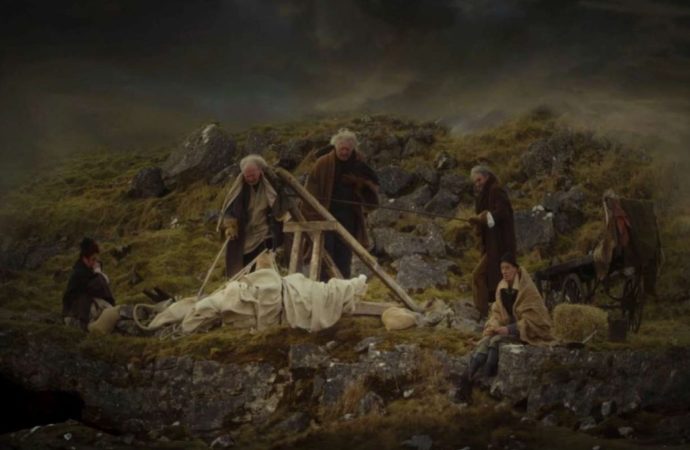
No one has posted any comments yet. Be the first person!